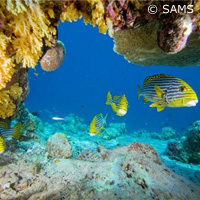Homeless marine species? Blame climate change
New international research suggests that increasing temperatures will affect the habitats of animals and plants, as several will be forced to leave their surroundings and find new environments; some marine species will have nowhere to go. The findings of the study, published in the journal Science, indicate how it will be difficult for marine species to keep up with the changes. Scientists led by the Scottish Association for Marine Science, Scottish Marine Institute in the United Kingdom compared changing temperatures for both land and sea and from across regions in the period from 1960 to 2009. The data helped the researchers project the speed at which both terrestrial and marine species populations would be forced to move in order to deal with the changing temperatures. Their results show there is no significant difference between movement rates in the environments. 'When temperatures rise, plants and animals that need a cooler environment move to new regions,' explains Dr Mike Burrows from the Scottish Association for Marine Science. 'The land is warming about three times faster than the ocean, so you might simply expect species to move three times faster on land, but that's not the case. If the land temperature becomes too hot for some species, they can move to higher ground where temperatures are generally cooler. That's not an option for many marine species which live at, or near, the surface of the ocean. When temperatures rise, species such as fish will be able to move into deeper water to find the cooler environments they prefer - but other species, such as marine plants or slow-moving corals, will have to move further to find suitable habitats, and could become trapped if there are no cooler places for them to go.' For his part, Dr John Bruno of the University of North Carolina in the United States, concurs that it would be much harder for marine species to keep up with the climate change. 'Being stuck in a warming environment can cause reductions in the growth, reproduction and survival of ecologically and economically important ocean life such as fish, corals and sea birds,' says Dr Bruno, one of the authors of the study. The results of the study also shed light on the variation in ocean surface temperatures within a very small region. Species movement is triggered by this variation as well. For instance, marine temperatures in the spring season arrive around five days per decade earlier on the east coast, while no shift has materialised on the west coast. 'The areas where species would need to relocate the fastest to stay ahead of climate changes are important biodiversity hotspots, such as the coral triangle in south-eastern Asia,' Dr Burrows says. 'Our study may help conservationists to prepare for change and protect future coral habitats.' Experts from Australia, Canada, Denmark, Germany, Spain, South Africa, the United Kingdom and the United States contributed to this study.For more information, please visit:Scottish Association for Marine Science:http://www.smi.ac.uk/Science:http://www.sciencemag.org/
Countries
Australia, Canada, Germany, Denmark, Spain, United Kingdom, United States, South Africa



